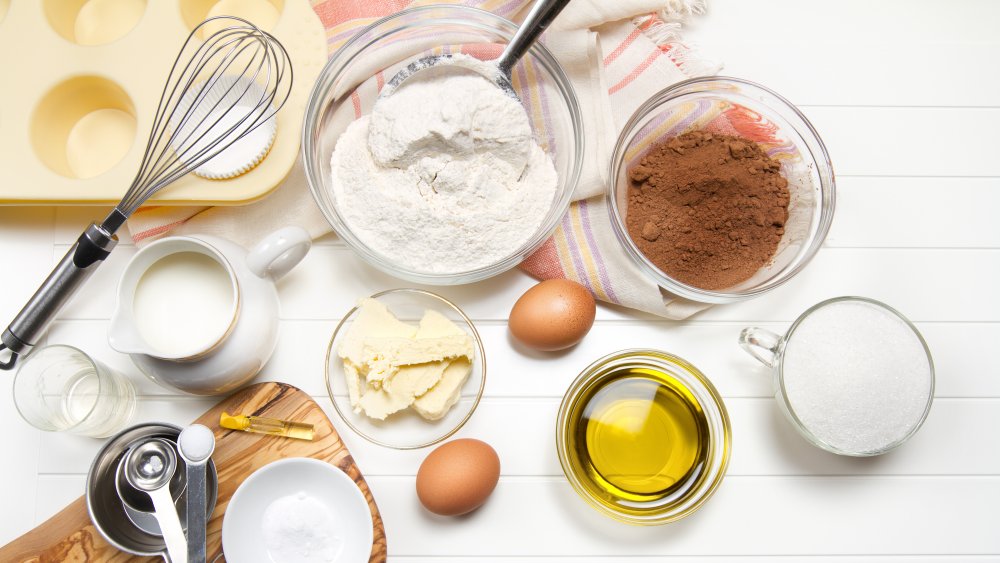What Happens When You Eat Muffins Every Day
Depending on who you ask (and where you get them from), the muffins you grab from your favorite bakery or coffee shop every day are probably a super-convenient way to start your day. Unfortunately, they also might be a sugar bomb that's affecting your head-to-toe health. As the Harvard T.H. Chan School of Public Health points out, a blueberry muffin you might pick up from a coffee shop packs nearly 470 calories, 68 grams of carbs (made of white flour), and a staggering 39 grams of sugar — which Livestrong notes is the amount in a can of regular Coke.
There's a reason why the American Heart Association says women should really only be consuming up to 6 teaspoons of sugar a day, or the equivalent of 100 calories, and men 9 teaspoons, or 150 calories. Other than the fact that so much sweetness can cause weight gain, sugar doesn't actually make you feel full. In fact, it does just the opposite, making you feel hungrier, per Healthline.
Too much sugar has also been associated with heart disease, high blood pressure, and an increased risk of developing type 2 diabetes (via Healthline).
Eating a daily muffin can harm your heart health
Sugar isn't the only reason why store-bought muffins should be an occasional treat and not a daily staple. As Harvard researchers point out, regular commercial muffins can also contain as much as 367 mg of sodium. And even if you pick a reduced fat blueberry muffin, not only are we looking at the same amount of sugar (39 grams), we would also be consuming 540 milligrams of sodium. In case you're wondering, the American Heart Association says you shouldn't have more than 2,300 milligrams of sodium a day — but really, we should be looking at 1,500 milligrams a day.
There is no doubt that a small amount sodium is important to the human body, but too much sodium causes your body to start to accumulate water (via Harvard School of Public Health). And this can trigger an increase in the volume of blood in your bloodstream, which can put stress on your heart. This is why a high sodium diet can lead to high blood pressure, heart failure, and stroke
Overindulging in muffins can raise your risk of diabetes
As The New York Times notes, the nutritional profile of muffins from commercial bakeries aren't all that different from that of a generous helping of birthday cake. To prove the point, the publication points out that a honey bran raisin muffin from Dunkin' Donuts has 40 grams of sugar. A blueberry muffin at Starbucks has 29 grams of sugar, while a Hostess Twinkie has 18 grams.
Much of that comes down to the use of refined flour (also found in many bagels). Like sugar, refined flour has calories. And thanks to the milling process, refined flour on its own contains no fiber, vitamins, or minerals. The absence of any bran or germ makes refined flour products easy to digest; they are also digested fairly quickly and can trigger quick spikes in your blood sugar and insulin levels. Healthline points out that foods made with refined carbs like white flour are linked to overeating and increase the risk of obesity and type-2 diabetes. One study shows that eating a diet of processed foods can even see you consume as much as 500 calories a day more (via Business Insider).
Here's the healthy way to eat a muffin every day
But enjoying muffins every day doesn't have to be a nutritionally challenging exercise. In 2012, the Harvard School of Public Health and the Culinary Institute of America got together to carry out what they called a muffin makeover, which involved using whole grains and healthy fats, and cutting back on salt and sugar, to create healthy recipes you can make at home. The resulting treats featured five tasty flavors, including blueberry, cranberry orange, lemon chickpea, jalapeno cheddar corn, and whole wheat banana nut.
"It's time to end the low-fat myth," Harvard professor of epidemiology Walter Willett said. "Unfortunately, many well-motivated people have been led to believe that all fats are bad and that foods loaded with white flour and sugar are healthy choices. This has clearly contributed to the epidemic of diabetes we are experiencing and premature death for many. The lesson contained in these healthy muffins — that foods can be both tasty and good for you — can literally be life-saving."
So if you want to make muffins your everyday breakfast ally and not a dietary foe, you're best off making them at home, which will ensure you're getting the nutrition and fiber you need to start your day — without all the unhealthy side effects.



